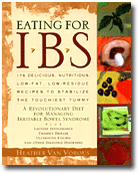| |
 |

Organic Acacia
Soluble Fiber
The prebiotic fiber that reduces bloating & gas!

In this Issue...
Food & Recipes
Special Events
Rx News & Research
Ask Heather
About Us

Gut-directed hypnosis is one of the most effective ways to help relieve all IBS symptoms! Results can last more than 5 years.


Fennel Tummy Tea for
IBS Bloating & Gas
Fennel has anti-spasmodic properties and it stimulates the production of gastric juices. Fennel tea is the best for relieving bloating and gas!

Get the IBS Diet Kit!
With Eating for IBS, plus organic fennel tea for bloating and gas, plus peppermint caps to prevent spasms and pain.
Take control of your IBS!

Get stable now ~
and stay that way!
Did you miss the latest
IBS newsletter and
Macaroni & Cheese?
Past issues
are posted here!

Peppermint Tea for
IBS Pain &
Spasms
Peppermint is a smooth muscle relaxant and has pain-killing properties. Our Tummy Tea is large leaf with a high volatile oil content - much stronger than tea bags!

The IBS Starter Kit!
Learn every way possible to successfully manage your symptoms!
With the First Year: IBS, an essential guide, plus Eating for IBS, plus Acacia Tummy Fiber to start stabilizing immediately!

Try Peppermint Caps
Peppermint Caps are the best for abdominal spasms, cramps and pain!

Heat Therapy for
IBS
Hot packs can help prevent stress-related attacks!

Delicious Recipes
for IBS!
Learn how to eat well and feel better

|
 |
|
| |

IF YOUR NEWSLETTER IS HARD TO READ OR IF THE LINKS DON'T WORK,
Please copy and paste this address into your browser window:
http://www.helpforibs.com/news/newsletter/potsoup051204.html
May 12, 2004
Hello to everyone -
This week we have a wealth of new digestive health research findings, including several updates on IBS drugs. Plus, a fabulous recipe for the very best Baked Potato Soup ever - enjoy!
Best Wishes,
Heather Van Vorous
Note: Did a friend send you this newsletter? Sign up here for your own free subscription.

Best Baked Potato Soup Ever!
Makes 4-6 servings
2 medium Russet potatoes, unpeeled
2 T non-hydrogenated soy margarine or canola oil
1/2 cup - 1 cup diced white onion
2 T all-purpose flour
4 cups fat-free chicken or veggie broth
2 cups water
1/4 cup cornstarch
1 cup instant mashed potatoes (check ingredients for a dairy-free brand)
1/2 t salt
1/2 t pepper
1/2 t dried basil
1/8 t thyme
1 cup soy or rice milk
Shredded cheddar soy cheese for garnish
Soy bacon bits (such as Bacos) for garnish
Finely diced fresh chives for garnish
Scrub potatoes thoroughly, poke with a fork, and microwave until tender (about 9-12 minutes on HIGH, depending on your microwave). Alternately, bake potatoes at 400F for one hour until tender. Set potatoes aside to cool.
While the potatoes cool, heat the soy margarine or canola oil in a large stockpot and saute onions until light brown. Add in flour to make a roux (a paste). Add chicken/veggie broth, water, cornstarch, instant mashed potatoes and spices, and bring to a boil. Reduce heat and simmer for about 5 minutes to meld flavors.
Peel cooled potatoes and chop into medium pieces. Add potatoes and soy/rice milk to stockpot and return to boil. Reduce heat and simmer for about 15 minutes, or until thick. Add salt and pepper to taste. Garnish individual bowls as desired with soy cheddar cheese, soy bacon bits, and chives.
Thanks to Kree for this incredible recipe! For hundreds of other delicious IBS recipes, come visit the IBS Recipe Board.
Are you just learning how to eat for IBS? A little intimidated at the thought of special IBS recipes? Not quite sure just what makes these recipes special in the first place? Don't worry! Come see
the IBS Diet pages, and find the answers to all your questions.
 Share Your Personal Fibromyalgia/IBS Survivor Story
Share Your Personal Fibromyalgia/IBS Survivor Story
Fibromyalgia Aware magazine is looking for a very special personal fibromyalgia survivor story. If you have a story to share they are interested! They're looking for an inspirational story that talks about how you have gone from the adversity of fibromyalgia to having a quality filled life. They would like you to share what you did (or others did) to help you move forward with your life. How have you dealt with (and continued to deal with) the symptoms of FM and overlapping conditions? Do you feel like your life is now better (or worse) because you have experienced a challenging health condition? What gives you hope for the future? What is different about your life now from before you had FM? What makes your story unique? What advice can you offer others with FM?
If you're interested in submitting your story to FM Aware Magazine,
 Zelnorm Warning Issued by FDA
Zelnorm Warning Issued by FDA
The Food and Drug Administration (FDA) announced the addition of serious new risk information to the health professional labeling for Zelnorm. The specific revisions include:
A new warning about the serious consequences of diarrhea associated with the medication.
A new precaution about ischemic colitis and other forms of intestinal ischemia (reduced blood flow to the intestines).
The new warning states: "Serious consequences of diarrhea, including hypovolemia, hypotension and syncope have been reported in the clinical studies and during marketed use of Zelnorm. In some cases, these complications have required hospitalization for rehydration. Zelnorm should be discontinued immediately in patients who develop hypotension or syncope. Zelnorm should not be initiated in patients who are currently experiencing or frequently experience diarrhea."
"The FDA currently has 21 reports of diarrhea so severe that it caused such complications as low blood pressure and fainting. Sixteen patients required hospitalization," said the FDA's Dr. Robert Justice.
"Since Zelnorm went on sale in 2002, the FDA has received 20 reports of ischemic colitis, plus three reports of a similar intestinal problem," Justice said. "Fourteen patients were hospitalized. Four died, although they had numerous other serious medical conditions."
Consumer watchdog Sidney Wolfe said Zelnorm is too dangerous to stay on the market and only slightly more effective than a placebo. He had urged the FDA not to approve the drug in the first place. "If a drug is actually more dangerous than a placebo and not much more effective, it is a very bad trade-off," Wolfe, head of Public Citizen's Health Research Group, said in an interview.
Under the post marketing experience heading in the adverse reactions section, the labeling now states: "Voluntary reports of adverse events occurring with the use of Zelnorm include the following: ischemic colitis, mesenteric ischemia, gangrenous bowel, rectal bleeding, syncope, suspected sphincter of Oddi spasm, bile duct stone, and cholecystitis with elevated transaminases. Because these cases are reported voluntarily from a population of unknown size, estimates of frequency cannot be made. No causal relationship between these events and Zelnorm use has been established. Hypokalemia secondary to diarrhea has also been reported."
Check here for more
information...
Fears Cited for Low Sales of IBS Drug Lotronex
Limits put in place to minimize potentially deadly risks from an irritable bowel drug may be discouraging patients from using it, says drug maker GlaxoSmithKline.
Glaxo pulled Lotronex off the market in November 2000, eight months after its debut, because of dozens of reports of users suffering severe constipation or ischemic colitis, inflammation of the large bowel caused by reduced blood flow. At least five patients died from those complications. The medicine was re-introduced in November 2002, with restrictions, in order to provide access to patients with severe forms of the disease and few options.
Doctors are encouraged to report side effects and sign a form saying they have told a patient about risks. Patients also are asked to sign a consent form.
About 10,000 patients, a far lower number than expected, received at least one Lotronex prescription from November 2002 through December 2003, Metz said. Only between 10 percent and 20 percent of patients got refills.
Some FDA panel members said the program was working by discouraging many patients from using the medicine. "That is what the point is," said Robyn Shapiro, professor of bioethics at the Medical College of Wisconsin.
The FDA believes the risk reduction program has been successful but will work with the manufacturer to identify overly restrictive barriers to drug access, said Dr. Robert Justice, head of the FDA's gastrointestinal drugs division.
Consumer watchdog Dr. Sidney Wolfe said the restrictions had failed to adequately protect patients. He said the drug should once again be withdrawn, and a tightly controlled research program set up for seriously ill patients.
Check here for more
information...
IBS Helped by Paroxetine, an Anti-Depressant Drug
Paroxetine, a drug commonly used to treat depression, can improve symptoms in people with irritable bowel syndrome (IBS), according to a study in the May issue of the American Journal of Gastroenterology. In a randomized double-blind, placebo-controlled study, researchers at the University of Pittsburgh School of Medicine found that the drug relieved some symptoms of IBS and improved the well-being of people with IBS.
The study found that the percentage of participants experiencing an improvement in overall well-being was significantly greater (63.3 percent) in the paroxetine group than the placebo group (26.3 percent). The percentage of participants experiencing an improvement in bowel movements was significantly greater in the paroxetine recipients (58.6 percent) than the placebo recipients (32.4 percent). There was a significant improvement in food avoidance and work function for those on paroxetine. There was no significant improvement in abdominal pain or bloating between the paroxetine and placebo groups.
"This study showed that in absence of depression, paroxetine helped irritable bowel syndrome," said Dr. Arnold. "This is a medicine that has been in use for some years and is safe with no long term side effects, which is a problem with current medications for IBS."
Check here for more
information...
Intestinal Gas May Contribute to IBS Symptoms
Intestinal gas and its associated symptoms (eg, bloating, distension, and flatulence) have long been trivialized and dismissed by many medical practitioners. Recent studies examining the relationship between these symptoms and the quality of life of patients with irritable bowel syndrome (IBS) report, however, that patients experience substantial distress because of these symptoms. In fact, patients with IBS often report that, even though they may be able to cope with the abdominal pain, they cannot tolerate the bloating and distension.
In an article in the December 2003 issue of Gut, Eamonn Quigley, MD, discusses the role of intestinal gas in IBS and its relationship to IBS symptoms. Patients with IBS do not appear to produce more gas than do individuals not suffering from IBS. They do appear, however, to suffer from abnormal gas transit, which result in gas retention in the small intestine. This gas retention, combined with visceral hypersensitivity, is likely to cause symptoms (ie, gas retention causes bloating and distension, whereas hypersensitivity causes patients with IBS to experience greater discomfort than is experienced by persons without IBS at the same level of retention). Gas content and transit appear to conspire with the motor and sensory responses of the gut to produce gas-related symptoms in patients with IBS as well as in individuals not suffering from IBS, according to Dr. Quigley.
Check here for more
information...
Natural History of Irritable Bowel Syndrome
Background: The natural history of irritable bowel syndrome is unclear, including the likelihood that these patients will be diagnosed with an alternative organic or functional gastrointestinal disorder. Understanding the stability of an irritable bowel syndrome diagnosis may limit repeated diagnostic evaluation among these patients.
Methods: The inclusion criteria included observational longitudinal studies of clinic-based samples of adult patients with irritable bowel syndrome. Only studies published in the English language in full manuscript form were included. Literature searches, selection and review of eligible articles, and data abstraction were performed in a duplicate, independent manner.
Results: Fourteen studies met study selection criteria. In six studies with relevant information, 2-5% of irritable bowel syndrome patients were diagnosed with an alternative organic GI disorder after 6 months to 6 years of follow-up. Long-term follow-up indicated that 2-18% of patients developed worse irritable bowel syndrome symptoms, approximately 30-50% of patients had unchanged symptoms, and the rest either improved or had symptoms disappear. Prior surgery (one study), higher somatic scores (one study), higher baseline anxiety (two studies), depression scores (one study) were predictive of worsening of symptoms during long-term follow-up.
Conclusions: Irritable bowel syndrome, a chronic disorder, is a stable diagnosis. Once initial investigations are negative, fewer than 5% are diagnosed with an alternative organic GI disorder. Repeated diagnostic evaluations of patients with recurrent or persistent symptoms similar to their baseline symptoms are not warranted.
Check here for more
information...
The Human Enteric Nervous System
Decades of work in animal models have demonstrated that the enteric nervous system (ENS) plays a key role in controlling gut functions. Recent advances made it possible to extend such studies to the ENS of man in health and even in disease. Such studies have already provided new insights into the pathophysiology of inflammatory and possibly functional bowel diseases. Studies on human ENS revealed both important similarities and differences between the ENS of man and of experimental animals. This article summarizes the current state of knowledge of the electrophysiology and neurochemistry of the human ENS, including relevant reflex mediated functions in the human gut.
Check here for more
information...
Looking for the latest IBS research and news?
Check out the IBS Research Library!
 How to Tell People You Have IBS
How to Tell People You Have IBS
"I need to talk to my friends and family about my IBS, but I'm embarrassed to do so. I know this is silly, but I can't help feeling this way. How do I get up the nerve to tackle this topic? And what do my friends and family need to hear?"
Deep down inside you surely know this already, but it's worth saying flat-out: it really is a necessity to gather your friends and family members for a heart to heart talk about IBS, how you're learning to control it, and the types of help you need from them to further minimize its impact on your life.
Are you cringing in anticipation? It's okay, I guarantee you're not the only one. Even though you do know that this is a step you should take, you probably feel at least a little hesitant about actually taking it. But this is a real shame, and I'll tell you why. One of the worst things about IBS is not actually an aspect of the disorder itself, but the fact that the whole problem has been ignored, dismissed, and even mocked for so long. This has made sufferers reluctant (at best) to outright fearful (at worst) of telling people that they suffer from this problem.
I personally kept IBS a secret from all but my closest family members and friends for over two decades. I'd make vague allusions to a "stomach problem" when I missed school or work due to attacks, and tried to deflect attention from the special food considerations I needed in restaurants or other people's homes. I felt at the time that this was absolutely necessary to save myself embarrassment or tiresome explanations in the face of blank stares and anticipated derogatory comments. However, in looking back now I wish I had been outspoken, frank, and honest from the get-go.
When you look at the situation objectively, it's absolutely absurd that IBS has ever been treated as something to be ashamed of. Would you be embarrassed to have a lung disorder? Heart disease? Problems with your liver? Of course not! Yet somehow, for some mysterious reason, digestive disorders as a whole are simply not accorded similar respect. With IBS, the common mistaken belief that it's a psychosomatic problem just adds insult to injury. This is wrong, and things are finally starting to change, albeit slowly. You can take heart in knowing that you are not the only person struggling with this, and you deserve to take pride in making the situation a little easier for the next sufferer by refusing to accept the status quo of being embarrassed by IBS. You've done nothing to deserve this, and you're not alone in living with it.
You really will help yourself tremendously by simply telling your friends, family, and close co-workers that you have this medical problem. Give them a clear, concise explanation of the physical goings-on, let them know how severely the symptoms can affect you and restrict your entire life, and thank them in advance for their consideration and support. Give them some fair expectations to live up to here and the odds are they will respond with sympathy, courtesy and genuine efforts to help. Be open about the lack of medical treatments available for IBS and stress the importance of lifestyle factors in managing the disorder.
If the people closest to you know how much you depend on the proper diet and stress management activities to remain healthy, they will realize that their support can make a critical difference in your life. Let them know that this is true - don't downplay or dismiss your need for their understanding and help. If you're looking for a way to get this ball rolling, here are some suggestions:
The Top 10 Questions About IBS Your Friends & Family Need Answered
1. What is IBS? What actually goes wrong with your body during an attack? (show them the IBS Glossary Page if you need help with this information)
2. Is there a cure or an effective medical treatment?
3. Can you prevent IBS attacks? How can we help you do this?
4. What type of diet do you have to follow? Why?
5. Is stress a big trigger? What helps you deal with it? How can we help with this?
6. Can you still go out to restaurants? What will make this easier for you?
7. What about holidays and parties? How can we help make these occasions safe for you?
8. What would you like us to do for you when you're at home?
9. What would you like us to do for you when you're in our homes?
10. What would help you most when we go out together?
If you're newly diagnosed with IBS, or if you've had IBS for quite a while but are still struggling, The First Year: IBS is a terrific resource for comprehensive information, research, and methods of successfully managing all of the symptoms of IBS. It's a great way to learn how live with the disorder and take control, instead of letting the IBS control you.
- Heather
If you're new to the IBS newsletter, we just wrapped up the Seven Sneaky Deadly Sins of the IBS Diet. Wondering what they all are? Check here...
1. Coffee (yes, decaf counts)
2. Yogurt (it's the safest dairy product for IBS...isn't it?)
3. Alcohol (just one glass of wine is okay, right?)
4. Vitamin supplements (they're good for you, aren't they?)
5. No insoluble fiber foods (they're triggers, so you just don't eat them, right?)
6. Too low a dosage of soluble fiber supplements
7. Not drinking enough water (doesn't soda pop count?)
 Heather & Company for IBS, LLC is dedicated to serving people with Irritable Bowel Syndrome. Our mission is to provide education, support, and products that allow people with IBS to successfully manage their symptoms through lifestyle modifications.
Heather & Company for IBS, LLC is dedicated to serving people with Irritable Bowel Syndrome. Our mission is to provide education, support, and products that allow people with IBS to successfully manage their symptoms through lifestyle modifications.
We offer extensive information and tangible help for IBS, including the world's best-selling and best-reviewed books for the disorder. We provide the internet's top IBS web site resources; a twice-monthly IBS Newsletter; seminars and classes; dietary brochures for patient distribution by health care professionals; an IBS Research Library; and Heather Cooks!, a healthy cooking show on Seattle television. Much of our work is based on Heather's development of the first and only comprehensive IBS dietary guidelines and recipes, an achievement which has earned numerous awards and accolades as well as thousands of thank you letters from IBS sufferers.
Heather & Company also provides the only patient-expert moderated IBS Message Boards on the internet with forums for diet, recipes, hypnotherapy, yoga, plus Crohn's and Colitis. In addition, we support and coordinate the formation and continuation of local in-person IBS support groups across the USA, Canada, the UK, Australia, and New Zealand. We will soon have other IBS services and products available.
Our website receives over 2 million visits each year, and our newsletter is sent to over 22,000 people. We are regular exhibitors at the Digestive Disease Week and American Dietetic Association conferences.
Sponsorship opportunities are available for the message boards and this newsletter for companies and/or products that have been legitimately established as helpful for digestive disorders.
Please contact us for information.

You are receiving this email because you have expressed interest in IBS news and information.
To unsubscribe from Heather's IBS Newsletter, click here http://www.helpforibs.com/news/unsub.asp or send an email to heather@helpforibs.com.
If you are viewing this newsletter on a website and would like to subscribe for email delivery, please "Join the IBS Newsletter" here.
ANTI-SPAM PRIVACY POLICY
LEGAL DISCLAIMER - This email is not intended to replace the services of a physician, nor does it constitute a doctor-patient relationship. Any application of the recommendations in this email is at the reader's discretion. Heather Van Vorous and Heather & Company for IBS, LLC are not liable for any direct or indirect claim, loss or damage resulting from use of this email and/or any web site(s) linked to/from it. Readers should consult their own physicians concerning the recommendations in this email.
Heather & Company for IBS, LLC
409 10th Avenue East Suite 202
Seattle, WA 98102 USA
© 2004 Heather & Company for IBS, LLC. All rights reserved.
|
|
|
|